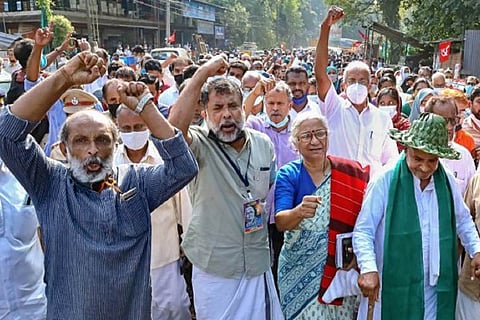

On March 30, in Thanur of Kerala’s Malappuram district, a family reinstated the survey stone of K-Rail in their compound. It had been toppled during recent anti-SilverLine protests in the state, but the family erected it again after a few local leaders from the Communist Party of India (Marxist) convinced the family about the project. While there are scattered reports such as this one from Kollam district too, can the CPI(M)-led Left Democratic Front government in Kerala convince all those who are affected to get on board with K-Rail and give up their properties and land?
Ever since the stone laying began as a marker for environmental impact survey, there were huge public protests against the project from across Kerala over land acquisition for K-Rail. People, environmentalists and the opposition party, Congress, joined the protests; following which the government temporarily stopped stone-laying and decided to convince people through door-to-door campaigning.
Apart from door to door campaigns, CPI(M) sympathisers are active on social media too. The following are examples of some posts they are sharing to get people on board with K-Rail. One such post read, “[Travel] swiftly to Kozhikode that has the fragrance of Biriyani. After K-Rail, Kerala will be [like] a single city. It will shrink so much that at 7 am in the morning, you can go to Kozhikode from Thiruvananthapuram, have a biriyani, and come back by noon.” And another said, “K-Rail compensation package. Those who give land to K-Rail, one from the family will have a job in K-Rail.”
Reji George, a CPI(M) sympathiser, went to the extent of comparing K-Rail to Ayyankali’s villuvandi (bullock cart) ride against casteism. During the 1890s, when social reformer and Dalit leader Ayyankali lived, riding animal carts was considered as an upper-caste privilege in Kerala. In protest, Ayyankali rode a villuvandi and challenged casteism.
Reji George wrote, “A train that connects all districts of Kerala is a follow up of Ayyankali’s Villuvandi. It will eradicate feudalism. For Dalits and women, apart from mere reservation, there should be many opportunities. To break the feudal, casteist oppression, there should be a liberal society. To do this, the first thing needed is freedom to travel. Railway tracks can cut off class differences.”
Some posts also highlight how cancer patients from northern Kerala will be able to easily reach Thiruvananthapuram and get treatment in Regional Cancer Centre.
Manoj K from Malappuram, whose neighborhood is seeing protests against K-Rail, tells TNM what CMPI(M) workers are telling people in their door-to-door campaign. “CPI(M) local leaders, Democratic Youth Federation of India (DYFI) workers go door-to-door, take time and convince people. They claim that in rural areas, they will give compensation four times more the market price of the land. In urban areas, they offer two times higher compensation. They also promise to compensate all the assets of the people including livestock, poultry and whatever else they lose when they lose land,” he said. He added that some in the neighborhood welcomed the campaigns while others were still skeptical and resistant.
But is the government in a position to fulfil these promises?
Sridhar Radhakrishnan, a renowned environmentalist, doesn’t think so. “According to the Detailed Project Report (DPR) Rs 6,100.3 crore has been set aside to acquire private land. The intention is to acquire land worth 1,198 hectares which means the maximum amount of compensation per cent of land is Rs 2 lakh. So what campaigners claim is not true. DPR cannot be changed based on they claim,” he said.
He added that the government cannot convince all people: “The people are aware, they know that the party and government is spreading misinformation and fudging data. They know about what is in the DPR. Here, the media has taken a critical stand as well as the common people.”
Sridhar also pointed out that people were questioning the CPI(M)’s social media campaigns also. For instance, to the argument that the K-Rail will allow cancer patients to travel to RCC in Thiruvananthapuram, people are asking why the Malabar Cancer Centre in Thalassery, Kannur, is not adequate and more economically and geographically feasible.
Sridhar further alleged that the government never considered the environmental impact of the project. “They will not dare to talk about the environment because they know that they will fail to convince people],” he said.
Thomas Pulickal, a 72-year-old farmer from Kottiyoor of Kannur district, who lost his land and house after acquisition by the government for an elephant corridor project in 2012, said, “I gave one acre of land and a really good house. Then, the market value was Rs 10,000 per cent, and the government offered Rs 1,208 per cent, which is around one tenth of market price. I got only Rs 6 lakh. Though a lower court ordered for more compensation a few years ago, the government has appealed against that order in a higher court.”
With Rs 6 lakh, he could buy only 10 cents of land. After taking a loan of Rs 2 lakh, he built a sheet-roofed kutcha house there. “I lost my livelihood of farming by losing the land. So, don’t believe the government. They won’t even pay market price, then how will they pay four times more?” Thomas questioned.